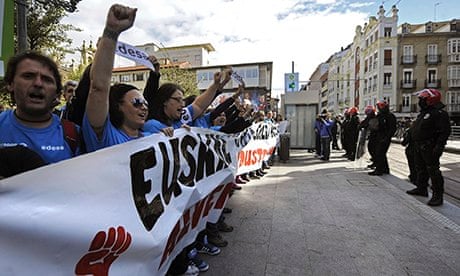Bankruptcy now appears the inevitable outcome for a major business within the Mondragón family of co-operatives, based in Spain's Basque country. Last minute efforts this week to recapitalise the white goods manufacturer Fagor Electrodomésticos have failed.
The collapse of Fagor Electrodomésticos is the most serious crisis to face Mondragón for many years - and is a bitter blow for the 5,600 workers who now face job losses. Several hundred workers have been occupying one of the plants affected, Edesa in the town of Basauri south of Bilbao, since Monday last week, whilst the town of Mondragón itself saw workers form a human chain outside the main headquarters of the co-operative group earlier this week.
Mondragón has iconic status within the global co-operative movement and has been much admired, and much visited, by British co-operators. Originally created by a charismatic local priest in the mid-1950s, it has grown into a major empire of over 100 co-operative businesses and ventures which together employ 80,000 employees and have a combined turnover of €13bn (£10.9bn). It is one of the top ten Spanish companies, dominates the Basque country economy and also has major overseas interests.
Mondragón is not a single business, rather a grouping of semi- autonomous co-operatives who federate together, contribute financially to group-wide initiatives and jointly establish Mondragón's strategy. The principle of solidarity between member co-operatives is a strong one, and in the past workers facing redundancy in one firm have been re-employed by other co-operatives.
The recent decision by the Mondragón Group General Council, to not rescue Fagor Electrodomésticos has led to bad blood locally. It had previously been suggested that Mondragón's own banking operation Caja Laboral might have been able to help, but Mondragón said that it has already invested €300m in Fagor in recent years and is not convinced that a rescue plan for the firm is viable. It says, however, that the group's Corporate Employment Office will try to help Fagor workers affected and has suggested that up to 1,200 people may be given work elsewhere or helped with early retirement. Mondragón is also hoping for European financial assistance to help staff retrain.
The bankruptcy of Fagor Electrodomésticos, which makes a wide range of domestic appliances including washing machines, fridges and ovens, has implications in the Basque country, and the governments of the two local Basque provinces have been actively engaged in Fagor's attempted rescue. There have also been media reports that Fagor was at one stage investigating recapitalising through investments from US hedge funds.
There are particular fears for the future of more than 50 Basque firms which supplied Fagor. There are also international repercussions. The firm owned a French subsidiary, Fagor Brandt, located in a western suburb of Paris, and one in Poland. Both these firms are now in administration.
Membership of Mondragón co-operatives is typically linked to financial investment by workers in their businesses. One of the demands of the workers occupying the Edesa plant is that individuals who have invested capital in Fagor should not be penalised by the firm's collapse. It is not clear whether these investments, including extra voluntary savings made by some people, will be saved.
Mondragón remains a formidable co-operative business empire, and other co-operatives within the federation are not directly affected by Fagor Electrodomésticos's collapse. Nevertheless, the group is strongly represented in traditional areas of manufacturing which are potentially more at risk during an economic downturn. Mondragón has adopted a four year 2013-2016 'road map' which aims to accelerate transition by the group into other, higher value-added areas of business, including further international investment. Within the group are fifteen research and development centres, and Mondragón also operates its own university, specialising in management and business innovation.
In a strongly worded statement issued in mid-October, Mondragón reaffirmed its commitment to the co-operative business model.
The headline and standfirst on this article was amended on 18 November 2013 to better reflect the article.
For more news, opinions and ideas about the social enterprise sector, join our community

Comments (…)
Sign in or create your Guardian account to join the discussion